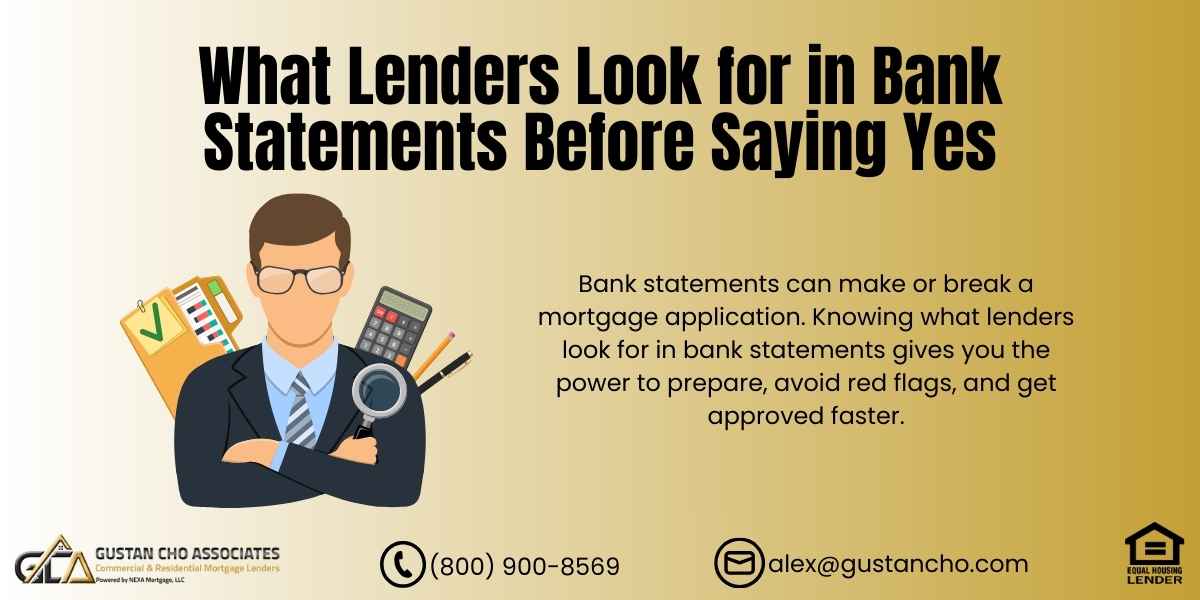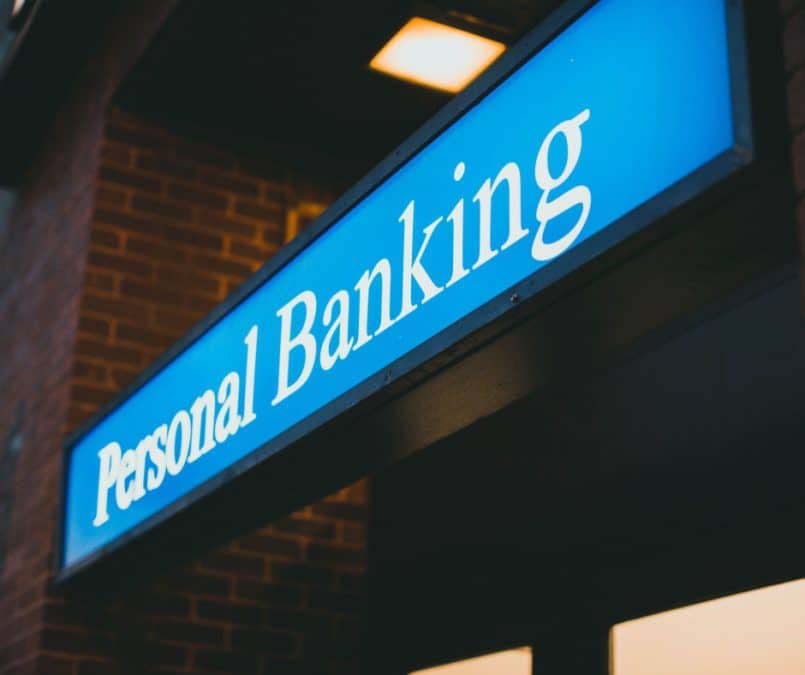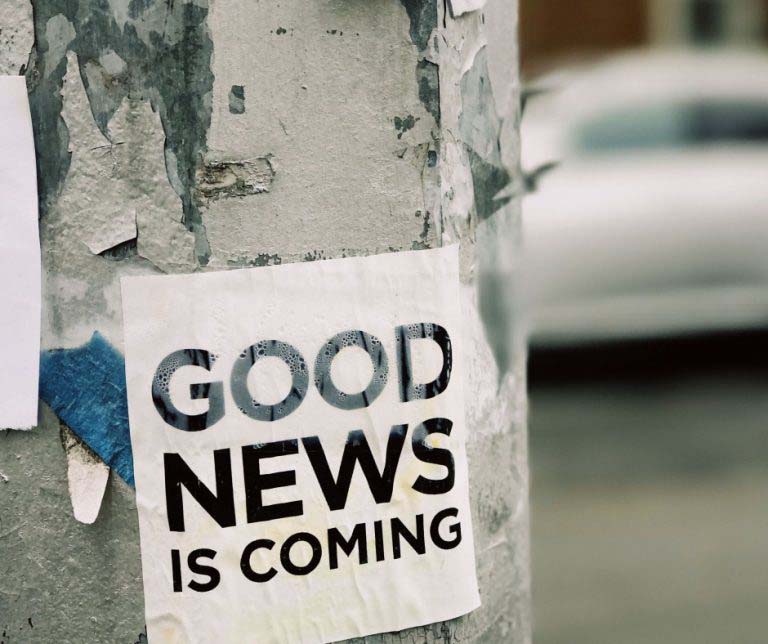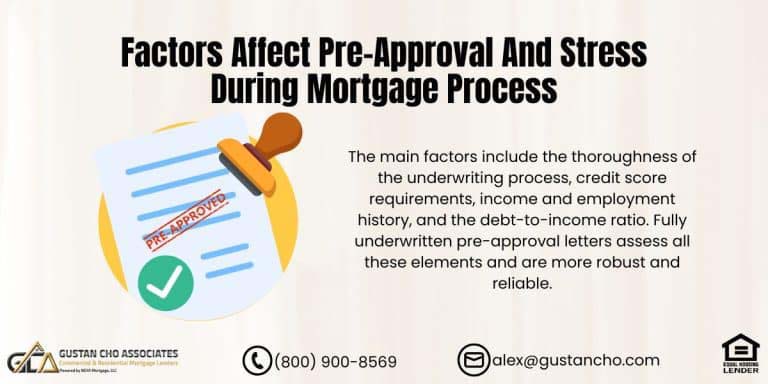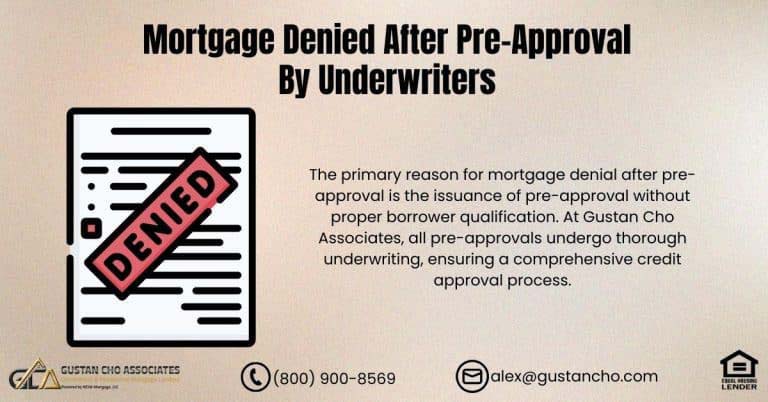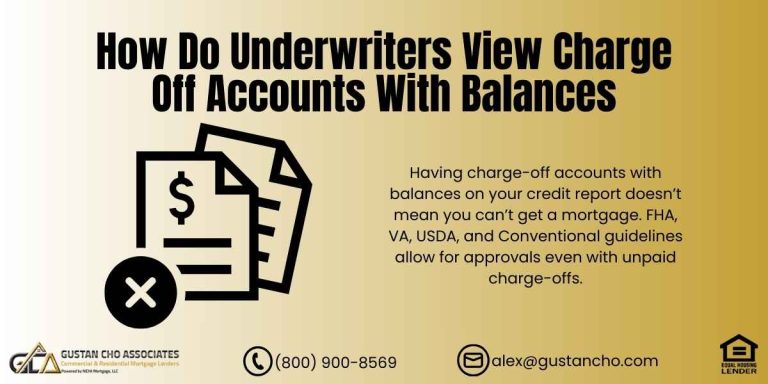What Lenders Look for in Bank Statements: 2025 Guide for Mortgage Approval
Getting a mortgage can be stressful, especially when lenders ask for your bank statements. A lot of people wonder what exactly lenders are looking for in those statements and why it’s such a big deal.
The truth is, bank statements give lenders a real-life snapshot of how you handle your money. Even with good credit or high income, your mortgage can be denied if your bank statements raise red flags.
At Gustan Cho Associates, we believe in making the process clear, simple, and stress-free. In this guide, you’ll learn exactly what lenders look for in bank statements, how many months are needed, common mistakes to avoid, and what options you have if you’ve been turned down by other lenders.
Why Do Lenders Review Bank Statements?
Before granting a loan, lenders must verify two key factors: first, they need to ensure that you possess the funds you claim for the down payment, closing costs, and reserves. Secondly, they need to assess whether you can manage the new mortgage without risking financial instability.
That’s why bank statements are required. Lenders look for consistent income, spending habits, and available savings. Understanding what lenders look for in bank statements can help you avoid surprises and prepare ahead of time.
Why do lenders ask for bank statements?
To verify income, assets, and that funds are from acceptable sources.
How Many Bank Statements Do Lenders Require?
Most lenders ask for 60 days of bank statements, but some may request 90 days, especially for jumbo loans or unique situations. FHA, VA, and Conventional loans usually require two months, while certain non-QM loan programs may allow flexibility.
Tip: Lenders may ask for additional months of records if your bank statements show overdrafts or unusual activity. Always be ready.
Key Factors Lenders Check
When underwriters review your bank statements, here’s what they check:
Proof of Funds
Lenders want to see that you have sufficient funds for the down payment and closing costs associated with the mortgage. This assurance demonstrates your financial readiness and commitment to the purchase.
Seasoned Funds
Your funds should have been in your account for at least 60 days to qualify. This requirement helps lenders verify the source of the money and ensures that it isn’t borrowed or comes from a questionable origin.
Consistent Income Deposits
Underwriters require regular and verifiable income deposits. They are looking for a reliable income stream, such as consistent paychecks from employment or documented income from other sources.
No Red Flags
An account free from issues like overdrafts, bounced checks, and unexplained large deposits is essential. These red flags can raise concerns about your financial management and stability.
Debt-to-Income Ratio (DTI)
Lenders look at your debt-to-income ratio (DTI) to make sure your income can cover your current bills along with the new mortgage payment. If your DTI is lower, it shows you’re in a better financial spot, boosting your chances of getting approved for a loan.
Stability
Keeping your account balances in check shows you’re handling your money well. Lenders like to see that you have some extra funds saved up as a safety net for any surprises or if you lose income.
Source of Funds
It’s important to provide documentation for your funds to eliminate any “mystery cash deposits.” Lenders need to understand where your money comes from to ensure it aligns with their guidelines and mitigate risks.
Knowing what lenders look for in bank statements lets you clean up your accounts before applying.
What Lenders Look for in Bank Statements: Do They Check for Overdrafts?
Yes. One of the biggest deal-killers is overdrafts. Even a single overdraft can raise concerns about money management.
- FHA and VA loans: Some lenders will deny if you’ve had overdrafts in the last 12 months.
- Conventional loans: Stricter lenders may flag even one overdraft.
- Gustan Cho Associates: We team up with lenders who are pretty flexible. Having one or two overdrafts isn’t a guaranteed no, especially if you can explain what happened.
Pro Tip: If you’ve had overdrafts, don’t panic. Some of our investors accept borrowers with overdrafts when other parts of the file are strong.
Do I need to season my funds before applying?
Yes—lenders usually want funds in your account for at least 60 days.
Why Do Lenders Care About Irregular Deposits?
When learning how lenders review bank statements, borrowers are often surprised that cash deposits can cause issues.
- Any cash deposit over $200 usually requires documentation.
- Large transfers or gifts must have a clear paper trail.
- Deposits that cannot be explained cannot be used toward a down payment.
This is to prevent fraud, money laundering, or borrowed funds being disguised as savings.
Can I Use Cash for a Down Payment?
Unfortunately, no. In the mortgage world, “cash is invisible.” Funds cannot be used for down payment or closing costs unless they are seasoned (in your account for 60 days).
Example: If you keep cash at home and deposit it just before applying, underwriters will reject it. The solution is to deposit cash early and let it season.
Do Lenders Compare Bank Statements to Loan Applications?
When applying for a loan, it’s super important to know what lenders look for in bank statements. Underwriters closely examine your statements and compare them to what you put in your loan application to ensure everything matches up. They pay attention to things like your income, deposits, and whether your account balances are steady.
This extra check is to confirm that your financial situation is accurate and to reassure lenders that you can pay back the loan.
They also watch for hidden debts or things you didn’t mention that could impact your financial health. If they find any mismatches between your bank statements and your application, it could lead to more requirements or even getting turned down for the loan. That’s why it’s really important to be upfront and transparent in your application to avoid any nasty surprises later in the loan process.
What Do Lenders Look for in Bank Statements Regarding Savings?
Savings accounts are just as important as checking accounts. Lenders want to see:
- Emergency funds: Enough reserves to cover 1–6 months of mortgage payments.
- Consistency: Regular deposits, no sudden large withdrawals.
- No negative balances: Red flags for financial instability.
Even if you’re approved with a low down payment, showing savings helps your approval.
What Happens If I Have Red Flags in My Bank Statements?
The common red flags that lenders look for in bank statements are:
- Overdrafts or NSF fees.
- Undocumented large deposits.
- Bounced checks.
- Negative balances.
- Payday loan deposits.
While many lenders will deny you for these, Gustan Cho Associates has investors who allow exceptions. With the correct letter of explanation, borrowers with past issues can still qualify.
Do All Lenders Have the Same Bank Statement Rules?
Not all lenders have the same rules when it comes to bank statements, which is a common area of confusion for many borrowers. Large banks often impose additional guidelines, known as overlays, that are stricter than the standard FHA, VA, or Conventional lending requirements.
This can make the process more challenging for borrowers, especially those who may not fit neatly within conventional lending criteria.
On the other hand, mortgage brokers, such as Gustan Cho Associates, work with a wide range of wholesale lenders—over 280 in fact. This allows them to connect borrowers with lenders that have more flexible guidelines suited to individual financial situations. Non-QM lenders provide helpful financing options, such as bank statement loans. These loans are great for self-employed people. Instead of just looking at tax returns, you can prove your income with 12 to 24 months of bank statements. This makes these loans a good choice for those with non-traditional income.
What If My Bank Statements Don’t Look Perfect?
Don’t give up. Even with overdrafts, odd deposits, or thin savings, you may still qualify. Options include:
- Non-QM loans (bank statement loans, DSCR loans, no-doc loans).
- FHA or VA manual underwriting for borrowers with challenges.
- Letter of explanation for unusual activity.
- Using a different bank account if one shows a cleaner history.
Steps to Prepare Your Bank Statements Before Applying
1. Avoid overdrafts at least 60 – 90 days before applying.
Maintaining a positive account balance is crucial as you prepare for your application. Overdrafts can signal financial instability to lenders, making it essential to avoid them in the months leading up to your application.
2. Deposit cash early so it seasons for 60 days.
For cash deposits, deposit them well in advance—ideally 60 days prior. This allows the funds to “season,” or sit in your account long enough for lenders to verify their source and legitimacy, enhancing your credibility.
3. Keep accounts stable – avoid large transfers or withdrawals.
For cash deposits, deposit them well in advance—ideally 60 days prior. This allows the funds to “season,” or sit in your account long enough for lenders to verify their source and legitimacy, enhancing your credibility.
4. Save for reserves – aim for 2–3 months of mortgage payments.
Building reserves equivalent to 2–3 months of mortgage payments demonstrates financial preparedness and responsibility. Lenders often look for reserves as a cushion, which can reassure them of your ability to handle unexpected expenses.
Document everything – gifts, transfers, or unusual deposits need proof.
Keeping thorough documentation for any gifts or unusual transactions is vital, as lenders typically require evidence to prove the legitimacy of these funds. Proper documentation can simplify the approval process and help avoid complications during your application.
Don’t Let Bank Statements Derail Your Loan
Be prepared with the right documentation before you apply.
2025 Updates on Bank Statement Requirements
While the basics haven’t changed, here are important updates borrowers should know:
- Fannie Mae and Freddie Mac continue to require two months of statements, but emphasize electronic verification through services like DU and LP.
- Manual underwrites will become more common in 2025 as affordability challenges rise. Underwriters will be stricter about overdrafts and unusual deposits.
- Non-QM bank statement programs are expanding, allowing self-employed borrowers to qualify based on income deposits instead of tax returns.
- Digital banking tools mean underwriters can catch overdrafts and transfers faster than ever. Transparency is key.
Final Thoughts: Work With Experts Who Understand Bank Statements
Bank statements can make or break a mortgage application. Knowing what lenders look for in bank statements gives you the power to prepare, avoid red flags, and get approved faster.
At Gustan Cho Associates, we’re one of the few mortgage brokers with no lender overlays. That means we go strictly by agency guidelines and work with over 280 wholesale lenders, giving us more options for borrowers with less-than-perfect bank statements.
Borrowers who need a five-star national mortgage company licensed in 50 states with no overlays and who are experts on what lenders look for in bank statements, please contact us at 800-900-8569, text us for a faster response, or email us at alex@gustancho.com. The team at Gustan Cho Associates is available 7 days a week, on evenings, weekends, and holidays.
Let us help you get the mortgage approval you deserve.
- Related> Home Loan With Bad Credit
- Related> Overdrafts In Bank Statements
- Related> Why Are Overdrafts In Bank Statements Scrutinized?
Frequently Asked Questions About What Lenders Look for in Bank Statements:
Q: Why do Lenders Even Ask for My Bank Statements?
A: Here’s what lenders look for in bank statements that’s why they ask for it: steady income, enough money for closing, and no red flags like overdrafts.
Q: How Many Months of Bank Statements do I Need to Give?
A: Most lenders want the last 2 months, but depending on the loan, they may check longer. This is part of what lenders look for in bank statements.
Q: Do Overdrafts Mean I Can’t Get Approved for a Loan?
A: Not always. Some lenders deny right away, but others are flexible. Overdrafts are one of the main things lenders look for in bank statements.
Q: Can I Use Cash for My Down Payment?
A: Cash doesn’t count unless it’s in the bank and “seasoned” for at least 60 days. That’s part of what lenders look for in bank statements to make sure money is legit.
Q: Will Small Transfers from Apps like Venmo or PayPal be a Problem?
A: Usually no, unless they are large or look like borrowed money.
Q: Do Lenders Check Savings Accounts, Too?
A: Yes. A healthy savings balance is a good sign of stability. They’re also part of what lenders look for in bank statements.
Q: What Happens if I have Big Deposits in My Account?
A: Large deposits need to be explained and documented. Lenders look for this in bank statements during mortgage approval.
Q: Do All Lenders Check Bank Statements the Same Way?
A: No. Big banks may be stricter, but brokers like Gustan Cho Associates work with lenders that are more flexible about what lenders look for in bank statements.
Q: Can I Still Qualify if My Bank Statements Don’t Look Perfect?
A: Yes. Even if you had overdrafts or unusual deposits, we have lenders who can help. Flexibility is key in what lenders look for in bank statements.
Q: What Should I do to Prepare My Bank Statements Before Applying?
A: Keep your account clean—no overdrafts, no sudden cash deposits, and steady savings. That’s the best way to pass what lenders look for in bank statements.
This article about “What Lenders Look for in Bank Statements Before Saying Yes” was updated on September 30th, 2025.
How do I prepare my bank statements for approval?
Keep deposits consistent, avoid large unexplained transfers, and stay transparent.


